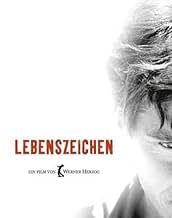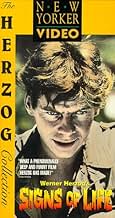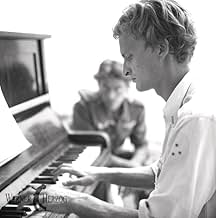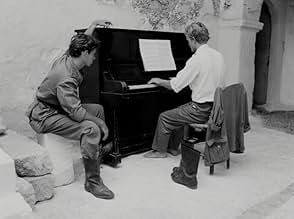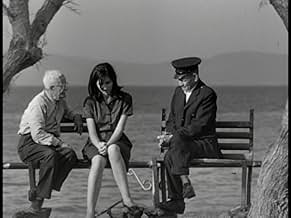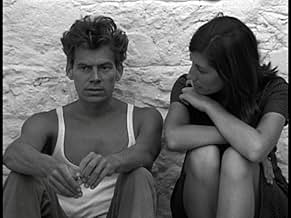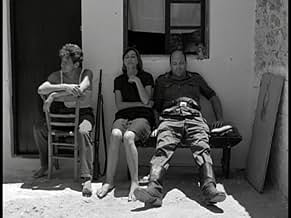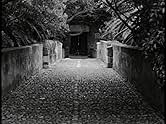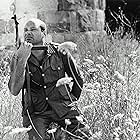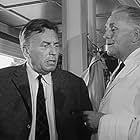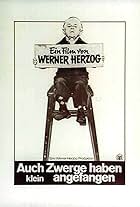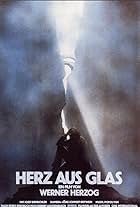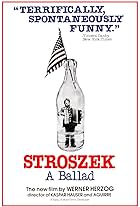IMDb RATING
7.0/10
2.6K
YOUR RATING
Three wounded soldiers are removed from battle and given the task of looking after a fortress in a small coastal town. However, the pressures of isolation begin to take their toll on the men... Read allThree wounded soldiers are removed from battle and given the task of looking after a fortress in a small coastal town. However, the pressures of isolation begin to take their toll on the men.Three wounded soldiers are removed from battle and given the task of looking after a fortress in a small coastal town. However, the pressures of isolation begin to take their toll on the men.
- Director
- Writers
- Stars
- Awards
- 2 wins & 2 nominations total
- Director
- Writers
- All cast & crew
- Production, box office & more at IMDbPro
Featured reviews
A wounded German paratrooper named Stroszek (Peter Brogle) is sent to the quiet island of Kos with his wife Nora (Athina Zacharopoulou), a Greek nurse, and two other soldiers recovering from minor wounds.
The fortress which gives the film's main setting is a real 14th-century fortress built by the Knights Hospitaller. Herzog's grandfather, Rudolf Herzog, lived and worked for several years as an archaeologist at this site, and published translations of the ancient Greek engravings which appear in the film. The old Turkish man who appears in the film with a written translation was the last surviving worker from Rudolf Herzog's archaeological project.
I am not as crazy about Herzog as some people. Some of his movies I like, and I actually tend to prefer his documentaries. This film was alright and quite good for a first feature. I love the fact he took his father's work and translated it to a film. That is so cool to keep that connection. Somewhere I heard a rumor that this film influenced "The Shining". I don't see it... and I can't seem to be able to confirm it. How strange if true.
The fortress which gives the film's main setting is a real 14th-century fortress built by the Knights Hospitaller. Herzog's grandfather, Rudolf Herzog, lived and worked for several years as an archaeologist at this site, and published translations of the ancient Greek engravings which appear in the film. The old Turkish man who appears in the film with a written translation was the last surviving worker from Rudolf Herzog's archaeological project.
I am not as crazy about Herzog as some people. Some of his movies I like, and I actually tend to prefer his documentaries. This film was alright and quite good for a first feature. I love the fact he took his father's work and translated it to a film. That is so cool to keep that connection. Somewhere I heard a rumor that this film influenced "The Shining". I don't see it... and I can't seem to be able to confirm it. How strange if true.
Acknowledged as the film that inspired Stephen King's novel, The Shining, Signs of Life is a film which touches upon the rationality of insanity in a world gone mad. Set during the German occupation of Crete during World War II, the story centers around a German paratrooper (Stroszek played by Peter Brogle) who was injured during his first mission and sent to oversee an old fort in the uneventful city of Kos. Accompanied by his young Greek wife Nora (Athina Zacharopoulou), and two other German soldiers who do not fit well within the German military model (Wolfgang Reichmann as Meinhard and Wolfgang von Ungern-Sternberg as Becker), Stroszek is plagued by boredom and his own apparent uselessness. However, his young wife dutifully occupies her time learning German and taking care of domestic duties for the three men, Meinhard uses his engineering and creative skills to devise, among other things, a cockroach trap, and Becker studies Greek classical inscriptions and architecture, with which the fort is replete. Stroszek's only escape for the boredom of life at the fort is making Roman candles with Nora.
Typical for Herzog, Signs of Life portrays this boredom very effectively through content, pace and script, but without consigning its audience to the same fate. As with the equally excellent Heart of Glass, the passage of time seems at once extenuated and ambiguous in Signs of Life.
Stroszek becomes edgy, obsessive and unpredictable. Eventually he complains to his superiors that he has nothing to do and he is placed on a countryside patrol which is just as useless as sitting around at the fort. Surveying a beautiful countryside densely populated with a sea of windmills from a high vantage point, Stroszek finally snaps. He chases his wife and fellow soldiers out of the fort with a shotgun (though he clearly does not want to kill any of them) and begins an ominous stand-off with the occupation forces.
Herzog's frequent themes are mostly present in Signs of Life and are remarkably mature in this first major work of the master director. Stroszek is a familiar Herzog character - a man at war with society, reality and, ultimately, himself. Although it is fairly easy to write him off as a lunatic, Stroszek's part is written and acted well enough to permit a great deal of empathy. In later films dealing with similar characters and plots (i.e. Aguire: Wrath of God and Grizzly Man, etc) Herzog would take on less sympathetic crazies and examine them just as sensitively and even more powerfully. As in many of the great director's films, Herzog's anti-hero protagonist is as much a malignant product of social circumstance as a mirror of the insane implications of their own social context taken to extremes.
In Signs of Life, this is accomplished by an amazingly subtle treatment of the insanity of the German role in World War II and Stroszek's context as both a soldier and collateral casualty of that context. Subtle - because neither of these issues are examined at any point in the film, but rather - they permeate the entire film and provide the canvass for the story Herzog paints.
Herzog wrote and directed the film at the age of 25, with a paltry budget and a hand-held 35mm camera, setting sail on what has, so far, been one of the most interesting and productive career voyages in film. As usual, the sets are perfectly chosen and along with the cinematography, make the film a visual masterpiece. The script and acting are also exceptional, and though Signs of Life requires a good attention span, it does not fail to engage and entertain at many levels simultaneously.
Typical for Herzog, Signs of Life portrays this boredom very effectively through content, pace and script, but without consigning its audience to the same fate. As with the equally excellent Heart of Glass, the passage of time seems at once extenuated and ambiguous in Signs of Life.
Stroszek becomes edgy, obsessive and unpredictable. Eventually he complains to his superiors that he has nothing to do and he is placed on a countryside patrol which is just as useless as sitting around at the fort. Surveying a beautiful countryside densely populated with a sea of windmills from a high vantage point, Stroszek finally snaps. He chases his wife and fellow soldiers out of the fort with a shotgun (though he clearly does not want to kill any of them) and begins an ominous stand-off with the occupation forces.
Herzog's frequent themes are mostly present in Signs of Life and are remarkably mature in this first major work of the master director. Stroszek is a familiar Herzog character - a man at war with society, reality and, ultimately, himself. Although it is fairly easy to write him off as a lunatic, Stroszek's part is written and acted well enough to permit a great deal of empathy. In later films dealing with similar characters and plots (i.e. Aguire: Wrath of God and Grizzly Man, etc) Herzog would take on less sympathetic crazies and examine them just as sensitively and even more powerfully. As in many of the great director's films, Herzog's anti-hero protagonist is as much a malignant product of social circumstance as a mirror of the insane implications of their own social context taken to extremes.
In Signs of Life, this is accomplished by an amazingly subtle treatment of the insanity of the German role in World War II and Stroszek's context as both a soldier and collateral casualty of that context. Subtle - because neither of these issues are examined at any point in the film, but rather - they permeate the entire film and provide the canvass for the story Herzog paints.
Herzog wrote and directed the film at the age of 25, with a paltry budget and a hand-held 35mm camera, setting sail on what has, so far, been one of the most interesting and productive career voyages in film. As usual, the sets are perfectly chosen and along with the cinematography, make the film a visual masterpiece. The script and acting are also exceptional, and though Signs of Life requires a good attention span, it does not fail to engage and entertain at many levels simultaneously.
Signs of Life is Werner Herzog's very first feature film and also one of his best. The script may have even inspired Stephen King's novel The Shining. In Signs of Life we have an injured soldier and his wife working as the caretakers of a military fortress on a Greek island. The soldier eventually goes mad with boredom and tries to kill his wife and everyone else.
Werner Herzog wrote the award winning script in 1964 and made the film in 1967 with only $20,000 at age twenty-five with a stolen 35mm movie camera. Herzog's script is amazing and all of the actors perform flawlessly. Signs of Life has great photography and a great use of Greek music and has Herzog's distinctive slow pace which may seem like torture to the average viewer who's been forced-fed a steady diet of fast food images.
Werner Herzog wrote the award winning script in 1964 and made the film in 1967 with only $20,000 at age twenty-five with a stolen 35mm movie camera. Herzog's script is amazing and all of the actors perform flawlessly. Signs of Life has great photography and a great use of Greek music and has Herzog's distinctive slow pace which may seem like torture to the average viewer who's been forced-fed a steady diet of fast food images.
Werner Herzog's debut feature tells the story of a wounded German paratrooper Stroszek (Peter Brogle) who is transported to the Greek island of Kos to recover physically and mentally. Already there are fellow soldiers Meinhard (Wolfgang Reichmann) and Becker (Wolfgang Von Ungern-Sterngberg), who are taking life easy in the sun with little to nothing to do. Stroszek sets them to work, but soon, as the work begins to dry up, he becomes more and more unstable in the isolation and loneliness.
Nobody really knows what goes through Herzog's head, but it is clear he is a film-making genius and has one of the finest eyes for visuals in cinema. Signs of Life explores themes that Herzog would later become engrossed and almost obsessed with - isolation, obsession and madness. While he would later employ Klaus Kinski as the face of wide-eyed insanity, here the tone is quiet, contemplative and often very funny. The opening half of the film concentrates mainly on the three soldiers trying to find things to do. Meinhard becomes frustrated with the presence of cockroaches in their apartment and builds a trap to catch them. The feeling of being trapped appears throughout the film, usually using animals - the soldiers are given a strange toy that seems to move on its own, until they open it and find out that it's full of trapped flies; and we are shown how a hen is hypnotised.
But the comedy is soon put aside as Stroszek begins his descent into madness, holding himself up in the 14th century fortress where the soldiers are stationed with a horde of ammunition. It's in the second half that Herzog shows us the images he can conjure. It's breathtaking what he achieves with a stolen 35mm camera and a micro-budget. Amongst other things, we see a seemingly endless field of windmills, and fireworks set off into the night sky. The grainy black-and-white imagery gives the whole thing a fresh beauty. This is far from the greatest debut in cinema, but a very clear indication of a director's raw skill, and of course, Herzog would go on to make many fine films.
www.the-wrath-of-blog.blogspot.com
Nobody really knows what goes through Herzog's head, but it is clear he is a film-making genius and has one of the finest eyes for visuals in cinema. Signs of Life explores themes that Herzog would later become engrossed and almost obsessed with - isolation, obsession and madness. While he would later employ Klaus Kinski as the face of wide-eyed insanity, here the tone is quiet, contemplative and often very funny. The opening half of the film concentrates mainly on the three soldiers trying to find things to do. Meinhard becomes frustrated with the presence of cockroaches in their apartment and builds a trap to catch them. The feeling of being trapped appears throughout the film, usually using animals - the soldiers are given a strange toy that seems to move on its own, until they open it and find out that it's full of trapped flies; and we are shown how a hen is hypnotised.
But the comedy is soon put aside as Stroszek begins his descent into madness, holding himself up in the 14th century fortress where the soldiers are stationed with a horde of ammunition. It's in the second half that Herzog shows us the images he can conjure. It's breathtaking what he achieves with a stolen 35mm camera and a micro-budget. Amongst other things, we see a seemingly endless field of windmills, and fireworks set off into the night sky. The grainy black-and-white imagery gives the whole thing a fresh beauty. This is far from the greatest debut in cinema, but a very clear indication of a director's raw skill, and of course, Herzog would go on to make many fine films.
www.the-wrath-of-blog.blogspot.com
10manjits
I first saw this film in 1969 in Bangalore (India) in a German film festival. The film was unheralded, being the first feature from an unknown director. However, the film made an everlasting impression on me, and I considered it among 2 or 3 of the best films I had seen till then. I kept track of Werner Herzog films ever since, and have been seeing them all I could lay my hands on. Even today, I'll put it as among the 10 best films I have ever seen, and it remains my favorite Herzog movie. The film is sheer poetry. It's a film about 3 characters'(2 soldiers and wife of one of them) boredom in an isolated Greek island, and how each one handles it. While one of the soldiers snaps up at the end, and tries to destroy everything in his impotent fury - managing only to kill a donkey ultimately - the second soldier keeps himself and first soldier's wife sane by just being raucously funny. I found the story, direction, camera-work and acting fascinating,and far from boring, as suggested by some reviews. I believe, Herzog has been influenced by India's Satyajit Ray in his style of presentation. He is one of the 3 most uncompromising film directors of the world in last 50 years, the other 2 being Ingmar Bergman and Robert Bresson, and his first feature is among his best.
Storyline
Did you know
- TriviaWerner Herzog's first feature film. Often regarded as a pioneer of New German Cinema, his films often feature ambitious protagonists with impossible dreams, people with unusual talents in obscure fields, or individuals in conflict with nature. In 1961, when Herzog was 19, he started work on his first film Herakles. He has since produced, written, and directed over 60 films and documentaries. He has also published over 12 books of prose and directed many operas. French filmmaker François Truffaut once called Herzog "the most important film director alive." American film critic Roger Ebert said that Herzog "has never created a single film that is compromised, shameful, made for pragmatic reasons, or uninteresting. Even his failures are spectacular." He was named one of the world's 100 most influential people by Time in 2009.
- Quotes
Young Child: Now that I can talk, what shall I say?
- ConnectionsFeatured in I Am My Films (1978)
- How long is Signs of Life?Powered by Alexa
Details
- Release date
- Country of origin
- Languages
- Also known as
- Feuerzeichen
- Filming locations
- Kos, Greece(main location)
- Production company
- See more company credits at IMDbPro
Box office
- Budget
- DEM 25,000 (estimated)
- Runtime1 hour 31 minutes
- Color
- Sound mix
- Aspect ratio
- 1.37 : 1
Contribute to this page
Suggest an edit or add missing content


